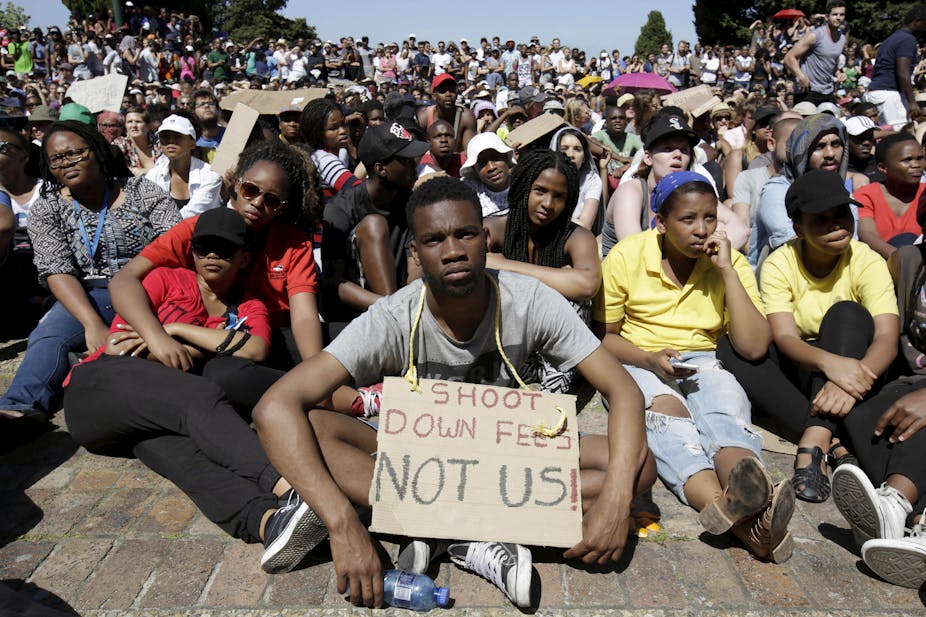There have been some disquieting contributions to the debate about South Africans’ right to access quality public university education. Some suggest that it is unsustainable. Such people insist that fee payments are unavoidable. Making free, quality university education available to all would impose a greater burden on the economy, and will only benefit students who can already afford to pay, we are told.
As academics working at South African universities and a student involved with the #FeesMustFall movement, we wish to take issue with such perspectives by locating the discussion in its proper context.
“Limited resources” are no excuse
Any discussion about the provision of health, education and similar public and social goods is unavoidably about a view of society and transformation. The same is true of any discussion about the funding of education as a public good. Many corporatist discourses on the subject talk about the “costs and benefits”, “rates of return” and the “economics” of education. These are predicated on a particular reading of the value and purposes of education.
Such perspectives attempt to limit the state’s capacity in favour of market mechanisms, among them “public-private partnerships”. This approach is merely a way of inserting the agendas of private appropriation and accumulation into the domain of public good. It has allowed the evolution of what has become a global “education industry”. It has led to the rise of corporate empires intent on commodifying education.
One common argument against universal free university education is that there are only “limited resources” available for public systems. And yet there are always resources for other choices made by government. These include the purchase of weapons, vanity projects such as World Cup soccer stadia and costly investments in non-renewable energy generation. It’s apparent that the idea of “limited resources” is based on a particular line of reasoning derived from conservative economic thinking. The present funding approaches are selective and limited. They do not address the country’s structural inequalities. Instead they increase social divisions and continue the exploitative practices of apartheid capitalism.
What, then, is a useful approach to the question of funding the full cost of public higher education?
It depends, in our view, on a number of prior values and principles and the assumptions underpinning these. Very importantly, society as a whole is implicated in a discussion about the choices made about the provision of public services. These choices should not be preempted by discussions about the quantum of fiscal and other resources.
The alternatives
What are we are proposing as alternatives to the status quo?
Firstly, a conceptual framework must be established around which practical possibilities can be built. Public will and democratic accountability needs to be mobilised. All people must be given the space to think more deeply about universal, free and quality public education as a constitutive condition for democracy and the public good. It is already possible to begin this process at universities and elsewhere through events devoted to robust and critical dialogue.
Universities and similar public institutions have a responsibility and a significant role to play in guiding discussion about the criteria for framing public choice. They can help people to understand how public funds are spent. Importantly, they can provide spaces where the views of those marginalised and excluded can be recognised and heard. Institutional decision making must be democratised beyond its limited managerial forms.
The fiscal debate must be opened up so that everyone can see what sources of funding can be immediately made available. These could examine, for instance, past and present models of universal free education globally. They might also explore the possibility of expanding the State’s revenue base through wealth and other redistributing taxes.
There will also need to be discussions about what sort of detailed research is needed to pave the way for universal, free and quality public education. These and other strategies informed by alternative social, political, economic and cultural choices could lead to a humane society where the potential of all its citizens will be realised.
A public good
Education as a public good should be regarded as essential to the development of citizens in a democratic society. Public resources must be used in ways that can support and engender ideas and practices which enhance cooperation, collegiality, social sharing, social responsibility, caring and social equalisation.
This sort of education can help to reconceptualise the goals of a socially just society. It can reorganise social relations more fundamentally than the current system does.
The goal of public quality education is to bring all of society, not just the “historically disadvantaged”, into the process of social transformation. It involves both those who are wealthy and those in poverty. This allows a process of genuine social reorganisation to start, and enables South Africa to address the structural characteristics of social inequality.
Now is the time
We realise the enormity of this undertaking. But we also recognise the great potential of the social agency demonstrated by history - such as the end of statutory apartheid.
The time is ripe. Since early 2015 South Africa’s university students and workers have set in motion the processes needed for deep and enduring social change. They have simultaneously defined the critical role that learning and education play in any such change.

